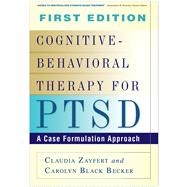Presenting clear-cut strategies for working with traumatized patients who have multiple co-occurring disorders and life problems, this highly practical manual puts an array of proven cognitive-behavioral strategies at the clinician's fingertips. The authors illustrate the "whats," "whys," and "how-tos" of exposure, cognitive restructuring, and other effective techniques for treating posttraumatic stress disorder (PTSD), and show how to organize interventions within a systematic yet flexible case formulation. Throughout, detailed clinical material shows exactly what the process of therapy looks like and offers guidance for overcoming treatment hurdles. More than 20 reproducible clinical tools are included.
See also the related self-help guide, When Someone You Love Suffers from Posttraumatic Stress, an ideal recommendation for clients and their family members.
See also the related self-help guide, When Someone You Love Suffers from Posttraumatic Stress, an ideal recommendation for clients and their family members.








